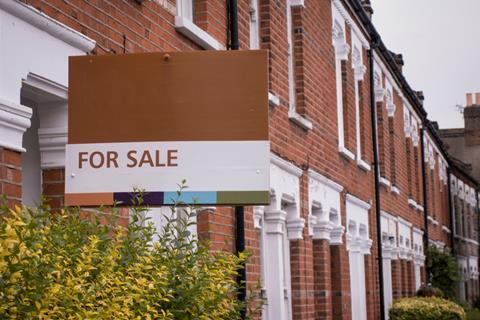Official figures show annual price inflation was running at 13.6% in August prior to Kwasi Kwarteng’s mini-Budget announcement
Experts are forecasting an “uncomfortably bumpy landing” for the housing market despite today’s publication of latest government data which showed that UK house prices rose 13.6% year-on-year in August.
The figures from the Office for National Statistics (ONS), which cover the period pre-dating the mini-Budget, show that while the rate of annual inflation narrowed in the month compared to the 16% reported in July, prices still rose by 0.9% month-on-month to reach another record high.
The ONS numbers, which are based on UK housing completions, found that the average cost of a home hit £295,903, with annual growth strongest in the South-west, where it hit 17%. It was weakest in London, where it reached 8.3%.

On a monthly basis, prices rose most quickly in the East Midlands, where the average cost of a house was up by 2.3%. The cost of a home actually fell by 0.2% in the West Midlands, the only part of the country to experience month-on-month price declines.
The figures showed a continuation of recent trends whereby growth in prices was much quicker for detached properties, the average cost of which grew by 15.9% in England, compared to just 11% for flats. The average cost of a new-build home also grew far more quickly than for properties in the second-hand market, with prices up 22.3% year-on-year, compared to just 5.9% for existing homes.
The figures come amid widespread expectations of imminent house price falls given sharp recent rises in mortgage rates in response to economic uncertainty and the market reaction to the mini-Budget measures.
According to figures from consumer finance website Moneyfacts.co.uk, mortgage providers had, as of yesterday, raised the average cost of a two-year fixed rate mortgage to 6.53% - a full 1.8 percentage points higher than it had been at the time of the announcement of the mini-Budget, adding hundreds of pounds to monthly repayments.
>> See also: What are housebuilding’s prospects in the wake of the mini Budget?
>> See also: Forecaster says housing starts will nosedive 40% next year
In addition, Moneyfacts said the number of mortgages available to first time buyers at 95% loan to value had drastically reduced, from 283 to 155 – a drop of 45%.
Credit Suisse and Capital Economics have predicted peak to trough house price falls of up to 15%, with housebuilders Barratt and Bellway already reporting a steep decline in reservations in recent weeks. Barratt said sales rates were down 47% on the same period last year while Bellway said equivalent numbers were down 35%. Both firms have abandoned expectations of growing output in the current financial year.
Despite the more gloomy outlook, commentators welcomed this week’s rowing back on the mini-Budget by new chancellor Jeremy Hunt, particularly given his decision to retain the £1.6bn per annum cuts to Stamp Duty contained in the original announcement.
Commenting on the ONS figures, Jonathan Hopper, CEO of Garrington Property Finders, said the mood on the property market had changed beyond recognition since the numbers were produced. “Though they were collected just a few weeks ago, the ONS’s figures are from a different age and a different property market,” he said.
“The chaotic aftermath of the former chancellor’s short-lived mini-Budget has sent mortgage rates soaring and sentiment sliding.
“The speed at which interest rates have risen has thrown many movers off-balance, triggering a hard reset on what many buyers can afford. In some areas, the landing will be uncomfortably bumpy.”
Chris Hodgkinson, managing director of HBB Solutions, said the recent “shambolic government performance” would leave its mark on the housing market. He added: “It’s important to note that these figures are reported on a lag of a few months and there’s no doubt that the increasing cost of borrowing will have dampened buyer activity, which in turn will see house prices dip before the year is out.”
























No comments yet